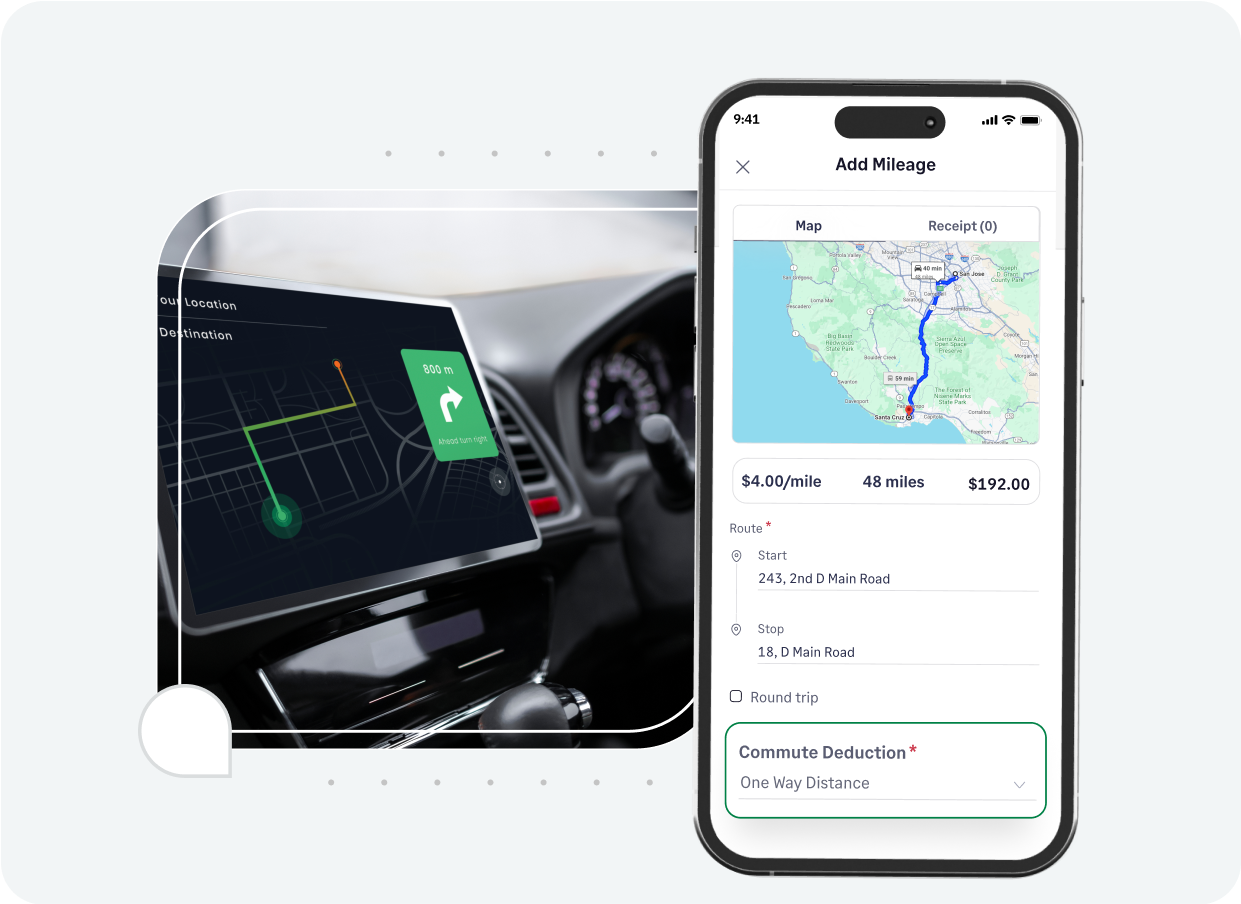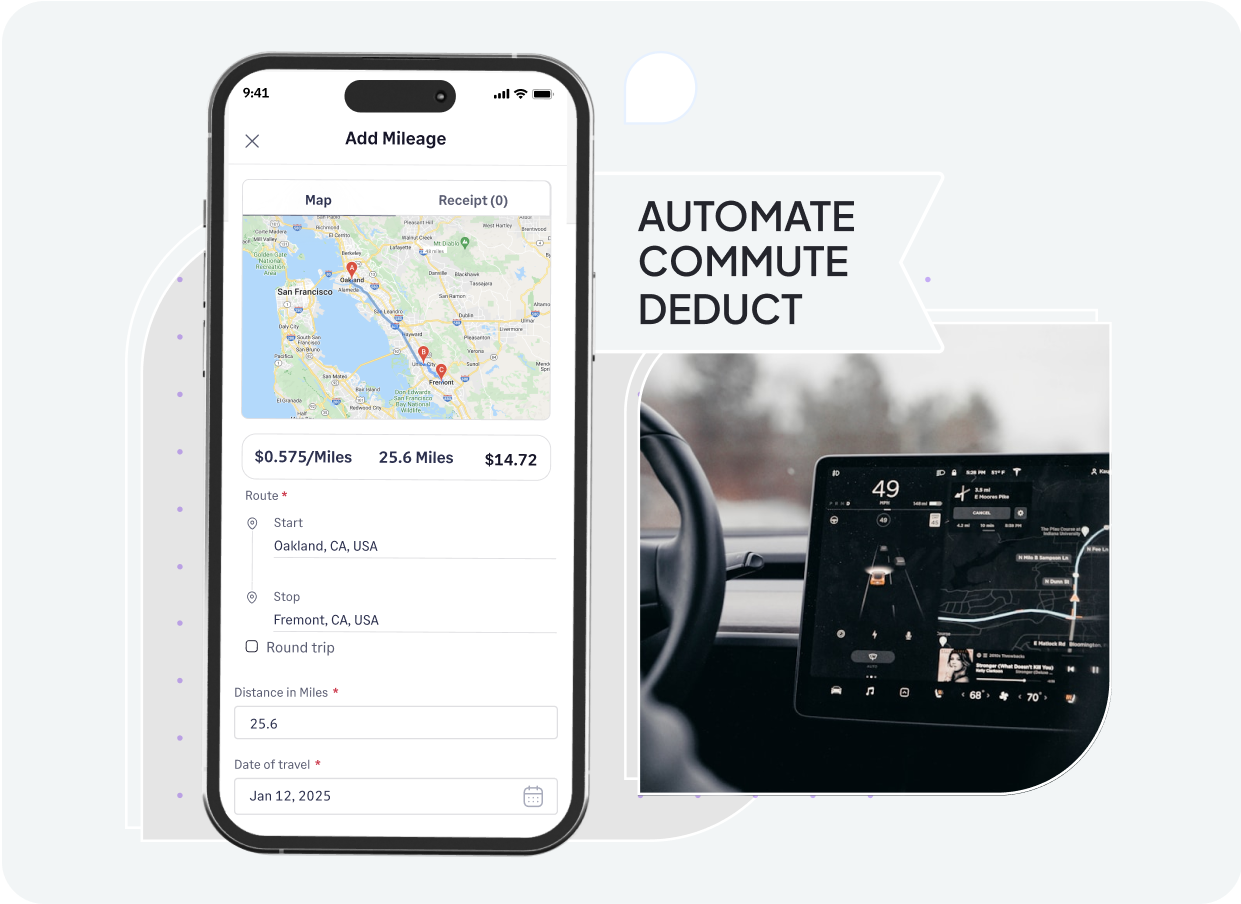Navigating mileage reimbursement in Wisconsin requires understanding both state and federal guidelines.
For employees using personal vehicles for work and employers aiming for fair and compliant compensation, this guide provides clarity on typical mileage rates, Wisconsin's relevant labor laws, and how Sage Expense Management can simplify the entire tracking and reimbursement process.
Wisconsin Mileage Reimbursement Rate
For private employers in Wisconsin, it is important to note that state law does not mandate a specific mileage reimbursement rate. There isn't a legislated per-mile amount that companies are legally obligated to pay their employees for using personal vehicles for business-related travel.
Despite the absence of a state-mandated rate, many Wisconsin businesses choose to adopt the standard mileage rates published annually by the Internal Revenue Service (IRS) as a practical benchmark. This is a widely accepted approach due to several factors:
- It provides a nationally recognized standard calculated to reflect the average costs of operating a vehicle for business purposes, including expenses like fuel, maintenance, insurance, and depreciation.
- Reimbursements made at or below the current IRS standard business rate are generally considered non-taxable income for the employee, provided accurate records are maintained.
- It offers a consistent and transparent method for fairly compensating employees for the use of their personal vehicles.
As of January 1, 2025, the key IRS standard mileage rates are:
- 70 cents per mile for business use of a vehicle.
- 21 cents per mile for medical or moving purposes (note: the tax deduction for moving expenses is currently limited to active-duty members of the U.S. Armed Forces).
- 14 cents per mile driven in service of charitable organizations.
For historical reference, here are the IRS standard business mileage rates from recent years:
It's important to distinguish these common practices from specific rates set for other purposes. For example, the University of Wisconsin System has its own mileage reimbursement rate for its employees (which is $0.70 per mile for 2025, aligning with the IRS rate).
Additionally, Wisconsin's Department of Workforce Development sets a specific rate for mileage reimbursement related to travel for workers' compensation medical treatment (which was 51 cents per mile in 2024).
However, these specific rates for university employees or workers' compensation do not apply to private-sector employers for general business mileage reimbursement.
Wisconsin Mileage Reimbursement Calculator
Need to get an estimate for your mileage reimbursement? Our Mileage Reimbursement Calculator is designed to help.
Using the Wisconsin Mileage Reimbursement Calculator is simple:
- Choose the tax year for which you want to calculate your reimbursement. The calculator uses the IRS standard mileage rates for that year, as these are a common benchmark in Wisconsin.
- Input the total business miles driven. The calculator will then provide an estimated reimbursement amount, offering a useful figure for both Wisconsin-based employees and their employers.
Calculate
Results
Some Important Wisconsin Mileage Reimbursement Laws
While Wisconsin doesn't set a specific mileage rate for private companies, certain labor laws are crucial to consider:
1. No State-Mandated Reimbursement Rate
Wisconsin law does not require private employers to reimburse their employees for mileage at a specific rate.
2. Wisconsin Minimum Wage Law is Key
This is the most significant legal consideration. Employers must ensure that any unreimbursed business-related expenses, such as mileage for work-related use of a personal vehicle, do not cause an employee's effective hourly wage to fall below the Wisconsin minimum wage.
- Wisconsin's current minimum wage is $7.25 per hour.
- An "Opportunity Wage" of $5.90 per hour may be paid to employees under 20 years of age for their first 90 consecutive calendar days of employment with an employer, after which they must be paid at least $7.25 per hour.
- For tipped employees, the cash wage is $2.33 per hour, with tips ensuring they reach at least $7.25 per hour.
- If unreimbursed driving costs effectively drop an employee’s earnings below these applicable thresholds for their workweek, it could constitute a minimum wage violation under Wisconsin law and the federal Fair Labor Standards Act (FLSA).
3. Adherence to Company Policy/Agreements (Wis. Stat. § 109.03)
If an employer establishes a policy or enters into an agreement to reimburse employees for mileage, they are expected to honor that commitment. Wisconsin's wage payment laws require employers to pay all wages earned, which would include any promised reimbursements.
4. Record-Keeping
Maintaining accurate and detailed records of business mileage (including dates, purpose of travel, and miles driven) is a best practice for:
- Employers: To accurately calculate any reimbursements they provide and to have documentation should questions arise regarding minimum wage compliance.
- Employees: To support reimbursement requests under company policy and for personal tax records if necessary.
Wisconsin Mileage Reimbursement Law vs Federal Law
Understanding how Wisconsin's regulations compare to federal laws is important:
Federal Law (FLSA):
- The Fair Labor Standards Act does not explicitly mandate mileage reimbursement by private employers.
- However, it requires that unreimbursed business expenses (like mileage) do not reduce an employee's effective earnings below the federal minimum wage ($7.25 per hour).
Wisconsin State Law:
- No Specific Reimbursement Statute: Wisconsin, similar to federal law, does not impose a specific mileage reimbursement rate on private employers.
- Aligns with Federal Minimum Wage: Wisconsin's minimum wage of $7.25 per hour is the same as the federal rate. Therefore, the FLSA's minimum wage protection regarding unreimbursed expenses directly applies in Wisconsin without a separate, higher state minimum wage to consider (unlike some other states).
- Enforcement of Promised Benefits: Wisconsin law ensures that employers pay wages and benefits that have been promised to employees as part of their employment agreement.
IRS Guidelines:
- These are federal tax guidelines, not laws forcing private employers to reimburse.
- They establish the standard rates at which mileage reimbursement is generally non-taxable to the employee. This is why many Wisconsin businesses adopt the IRS rates.
In Wisconsin, while employers have flexibility in setting their mileage reimbursement policies, they must be vigilant about the state's minimum wage laws to ensure unreimbursed travel costs don't inadvertently lead to violations.
How Sage Expense Management (formerly Fyle) Can Automate Mileage Tracking
Manually tracking mileage, whether for trips in urban centers like Milwaukee and Madison or across Wisconsin's extensive rural network, can be a cumbersome and error-prone process.
Sage Expense Management offers an intelligent, automated solution designed to help your businesses manage mileage tracking and reimbursement with precision and ease.
- Accurate mileage logs: Our Google Maps integration ensures every business mile is accurately captured. This provides reliable data critical for fair reimbursements and robust record-keeping for your Wisconsin operations.
- Uphold compliance with Wisconsin wage laws: By facilitating accurate and detailed mileage logs, we help Wisconsin businesses maintain the necessary records to demonstrate that employee earnings consistently meet or exceed the $7.25 per hour minimum wage, even after factoring in vehicle use for company purposes.
- Save valuable time: Empower your employees to focus on their core tasks, not on tedious mileage spreadsheets. Our user-friendly mobile app makes logging miles simple and can even track trips automatically. Employees can also submit expenses through familiar tools like Slack or Gmail, enhancing efficiency.
- Flexible to match your company’s policies: Whether your Wisconsin business opts for the IRS standard rate or has a custom reimbursement structure, Sage Expense Management can be configured to align with your specific mileage policies.
- Seamless integration and faster reimbursements: Connect Sage Expense Management with your existing accounting software (such as QuickBooks, Xero, NetSuite) for effortless data synchronization. We also supports direct ACH payments, ensuring your employees receive their reimbursements promptly.
- Streamlined workflows: Automated approval processes and reminders keep mileage claims moving efficiently, preventing bottlenecks and ensuring timely payment for your team in Wisconsin.
Eliminate the complexities of manual mileage tracking. Discover how Sage Expense Management can bring accuracy, compliance, and significant time savings to your mileage reimbursement practices in Wisconsin.


































